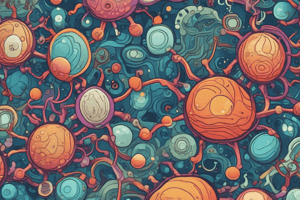Podcast
Questions and Answers
What is the primary enzyme responsible for initiating the release of non-esterified fatty acids from adipocytes?
What is the primary enzyme responsible for initiating the release of non-esterified fatty acids from adipocytes?
- Glycerol kinase
- Lipoprotein lipase
- Fatty acid binding protein
- Hormone sensitive lipase (correct)
What is the final product of triacylglycerol hydrolysis, apart from non-esterified fatty acids?
What is the final product of triacylglycerol hydrolysis, apart from non-esterified fatty acids?
- Glycogen
- Glucose
- Glycerol (correct)
- Triglyceride
What is the role of insulin in triacylglycerol metabolism?
What is the role of insulin in triacylglycerol metabolism?
- Activates lipoprotein lipase
- Inhibits hormone sensitive lipase (correct)
- Activates hormone sensitive lipase
- Inhibits glycerol kinase
What is the primary function of fatty acid binding protein in target cells?
What is the primary function of fatty acid binding protein in target cells?
What is the primary mechanism of non-esterified fatty acid uptake in target cells?
What is the primary mechanism of non-esterified fatty acid uptake in target cells?
What is the primary destination of non-esterified fatty acids released from adipocytes?
What is the primary destination of non-esterified fatty acids released from adipocytes?
How are non-esterified fatty acids transported in the bloodstream?
How are non-esterified fatty acids transported in the bloodstream?
What is the result of phosphorylation of hormone sensitive lipase?
What is the result of phosphorylation of hormone sensitive lipase?
Where are fatty acids stored primarily in the body?
Where are fatty acids stored primarily in the body?
What is the process of breaking down triacylglycerols to release fatty acids?
What is the process of breaking down triacylglycerols to release fatty acids?
What is the primary location of adipocytes in the body?
What is the primary location of adipocytes in the body?
What is the function of lipoprotein-lipase in fat storage?
What is the function of lipoprotein-lipase in fat storage?
What is the purpose of storing carbohydrates as glycogen in muscles?
What is the purpose of storing carbohydrates as glycogen in muscles?
What is the role of adipose tissue in energy production?
What is the role of adipose tissue in energy production?
What is the metabolic activity of adipocytes?
What is the metabolic activity of adipocytes?
What is the result of triacylglycerol hydrolysis in adipose cells?
What is the result of triacylglycerol hydrolysis in adipose cells?
What is the primary energy source for the body?
What is the primary energy source for the body?
What happens to glucose when energy demands exceed glycogen reserves?
What happens to glucose when energy demands exceed glycogen reserves?
What is the function of insulin in regulating glucose levels?
What is the function of insulin in regulating glucose levels?
What is the process of synthesizing lipids from excess glucose or other substrates?
What is the process of synthesizing lipids from excess glucose or other substrates?
What triggers the breakdown of lipids into fatty acids and glycerol?
What triggers the breakdown of lipids into fatty acids and glycerol?
What is the function of glucagon in regulating glucose levels?
What is the function of glucagon in regulating glucose levels?
When does lipogenesis occur?
When does lipogenesis occur?
What is the relationship between insulin and lipolysis?
What is the relationship between insulin and lipolysis?
Flashcards are hidden until you start studying
Study Notes
Relationships Between Lipid and Carbohydrate Metabolism
- Carbohydrates are the primary energy source for the body, broken down into glucose for immediate energy needs or stored as glycogen in the liver and muscles.
- When energy demands exceed glycogen reserves, lipids (fats) are broken down into fatty acids and glycerol for energy production.
- Insulin regulates glucose levels, promoting its uptake into cells for energy or storage, and inhibits lipolysis (breakdown of fats).
- Glucagon stimulates the breakdown of glycogen and fats to increase blood glucose levels when needed.
Lipogenesis and Lipolysis
- Lipogenesis is the process of synthesizing lipids from excess glucose or other substrates, occurring when there's an abundance of glucose.
- Lipolysis breaks down lipids into fatty acids and glycerol, triggered during fasting or when glucose levels are low, such as during prolonged exercise or fasting.
Fat Absorption and Storage
- Fatty acids are stored primarily in adipocytes as triacylglycerol.
- Triacylglycerol must be hydrolyzed to release the fatty acids.
- Adipocytes are found mostly in the abdominal cavity and subcutaneous tissue.
- Adipocytes are metabolically very active, with stored triacylglycerol constantly hydrolyzed and resynthesized.
Triacylglycerol Storage and Mobilization
- Adipose tissue releases stored triacylglycerols as needed for energy, with fatty acids and glycerol entering the bloodstream for cellular energy production.
- Non-esterified fatty acid release from adipocytes is initiated by the action of hormone-sensitive lipase (HSL).
- HSL is activated by epinephrine, norepinephrine, ACTH, and glucagon, and inhibited by insulin.
- Glycerol metabolism refers to the biochemical processes involved in the breakdown and utilization of glycerol, a three-carbon alcohol.
- Glycerol can be derived from various sources, such as triglycerides in dietary fats, adipose tissue lipolysis, or glycerol-containing compounds.
Studying That Suits You
Use AI to generate personalized quizzes and flashcards to suit your learning preferences.



